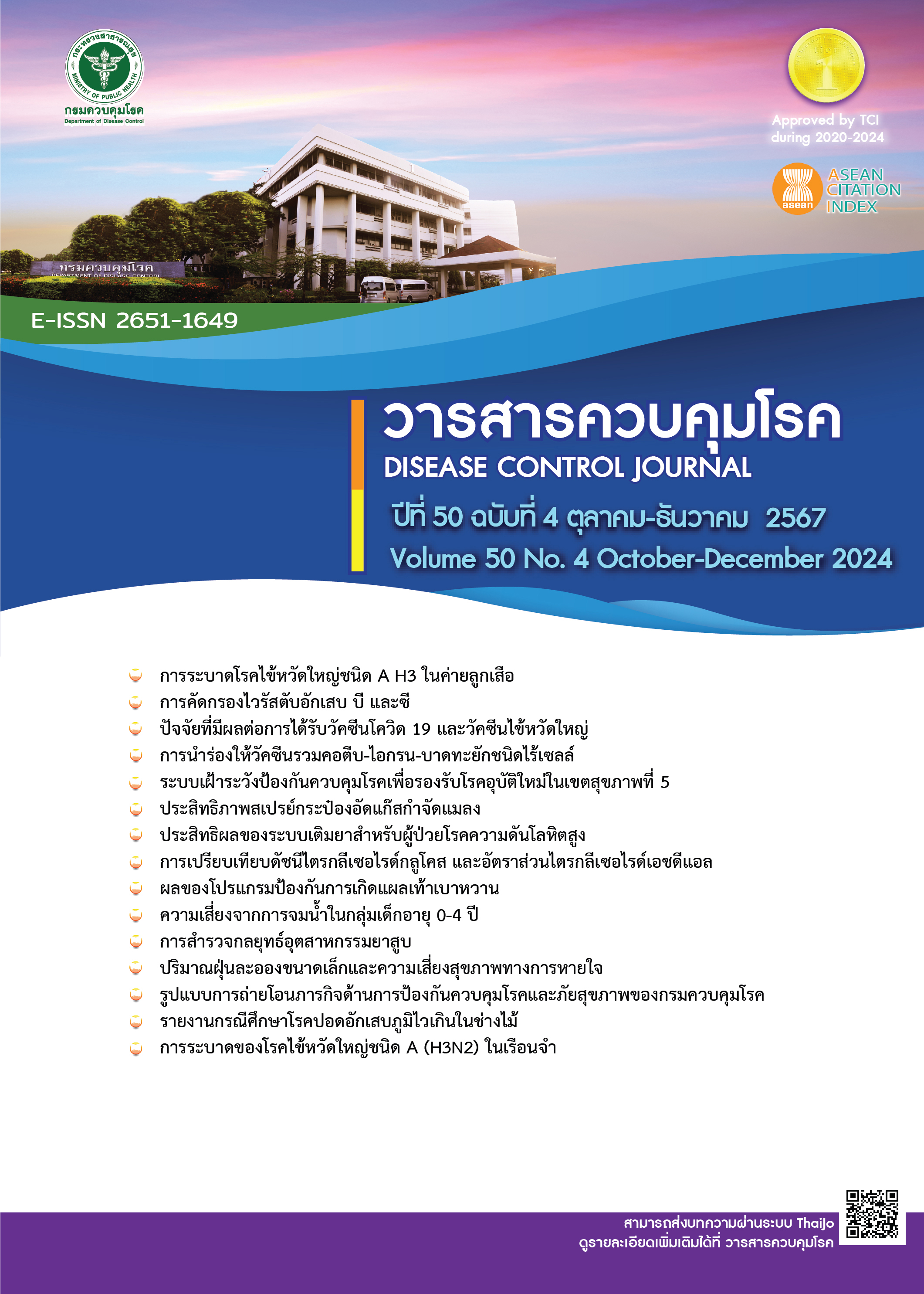The effects of diabetes foot prevention program on the knowledge and behaviors of foot care and foot health among the elderly with type 2 diabetes mellitus in a Public Health Service Center
DOI:
https://doi.org/10.14456/dcj.2024.54Keywords:
diabetic foot, foot care knowledge, foot care behaviors, foot health, King’s theory of goal attainmentAbstract
This controlled nonrandomized nonclinical trial (CNNT) research aimed to examine the effects of the diabetic foot prevention program applying King’s theory of goal attainment. The samples consist of 52 elderly with type 2 diabetes mellitus who had been identified as low or moderate risk of diabetic foot ulcer in a public health service center. The participants are equally divided into an experimental and a comparison group with 26 patients in each group. The duration of the intervention was 7 weeks. Data were collected at week 1, 5, and 7 by interviewed questionnaire that comprised of personal information, foot care knowledge, foot care behavior, and foot health assessment. Data were analyzed using descriptive statistic, chi-square test, Fisher's exact test, one-way repeated measure, independent t-test, and paired t-test. The research findings indicate that after receiving a diabetic foot prevention program, the experimental group had statistically significantly higher scores of knowledge and behaviors related to foot care for preventing diabetic foot at posttest and follow-up than pretest and those the comparison group (p-value<0.01). Additionally, the average foot health scores in the experimental group at follow-up were significantly higher than pretest and the comparison group (p-value<0.01). Therefore, the program applying King's goal attainment theory made the participants aware of their individual foot health issues. Setting goals and regularly evaluating progress provided continuous feedback for appropriate behavior. Along with increased knowledge and proper foot care behaviors, foot health problems can be improved.
Downloads
References
Ministry of Public Health (TH), Department of Health. The Department of Diabetes reveals that the elderly have diabetes second only after pressure, recommending diet-sugar-exercise [Internet]. 2022. [Cited 14 Feb 2023]. Available from: https://multimedia.anamai.moph.go.th/news/141165/#:~:text=กาย%20-%20อนามัยมีเดีย-,กรม%20อ.%20เผย%20ผู้สูงวัยป่วยเบาหวานเป็นอันดับ,2%20รองจากโรคความ
Siriniyomchai C. Management of Diabetic foot: Art and science of nursing. Bangkok: Sahamit Pattana Printing; 2020. (in Thai)
Walsh JW, Hoffstad OJ, Sullivan MO, Margolis DJ. Association of diabetic foot ulcer and death in a population-based cohort from the United Kingdom. Diabetic Medicine 2016;33(11):1493-8. doi:10.1111/dme.13054
Lu Q, Wang J, Wei X, Wang G, Lu Z, Liu P. Cost of diabetic foot ulcer management in China: A 7-years single-center retrospective review. Diabetes Metab Syndr Obes: Targets Ther 2020;14:4249-60.
Suwannakin A. Nursing care for foot care to prevent ulcer in diabetes persons. Bangkok: Surgical and Orthopedic Nursing Division; 2016. (in Thai)
Diabetes Association of Thailand Under the Patronage of Her Royal Highness Princess Maha Chakri Sirindhorn. Clinical practice guideline for Diabetes 2017. 3rd ed. Pathum Thani: Diabetes Association of Thailand Under the Patronage of Her Royal Highness Princess Maha Chakri Sirindhorn; 2017.
Srisomthrong K, Chintanawat R, Sucamvang K. Self-management supporting programme and its impact on foot-care behaviour of elderly type-2 diabetes patients. Thai Journal of Nursing Council 2017;32(3):120-34. (in Thai)
Roning N, Naka K, Chinnawong T. The Effects of self - care promoting program on foot care behaviors, foot conditions and blood sugar levels among Muslim elderly with uncontrolled Diabetes Mellitus. Sonhklanagarind Journal of Nursing 2021;41:74-87. (in Thai)
Kaewsong P, Masingboon K, Keeratiyutawong P, Melkus GDE, Deoisres W. Effects of a self-management support program on foot care knowledge, foot care behaviors, perceived social facilitation support, and HbA1c among people with type 2 diabetes at low risk of diabetic foot complications. Journal of The Police Nurses 2018;10(2):385-99. (in Thai)
Hadi Sulistyo AA, Sae Sia W, Maneewat K. The effect of a foot care camp on diabetic foot care knowledge and the behaviours of individuals with diabetes mellitus. Journal of Health and Nursing Research 2018;23(5):416-25. doi: 10.1177/ 1744987118765903.
King IM. Toward a theory for nursing: general concepts of human behavior. Wiley; 1971.
Potaros D. King’s Theory of Goal Attainment for the Client at Year 2000. The Journal of Faculty of Nursing Burapha University 1999;7(2):19-28. (in Thai)
Maneewan S, Powwattana A, Thiangtham W, Nilanon Y. An Application of King’s Theory of Goal Attainment for Family Caregivers to Prevent Complications among New Case of Stroke. Journal of Health and Nursing Research 2021;37(2):131-44. (in Thai)
Ladee C, Lagampan S, Pichayapinyo P, Mayurasakorn K, Lagampan C. Effect of a goal attainment nursing program self-management and blood pressure control high-risk hypertensive patients in a primary care unit. Siriraj Medical Journal 2020;72:140-50. doi: 10.33192/Smj.2020.19.
Ministry of Public Health (TH). Committee on the development of elderly health screening and assessment tools. Handbook of Screening and Health Assessment for the Elderly 2021. Nonthaburi: Ministry of Public Health; 2021. (in Thai)
Cohen J. Statistical power analysis for the behavioral sciences. 2nd ed. Hillsdale, NJ: Erlbaum; 1988.
Prachanno W, Aramsin R, Gadudom P. Effects of a self-foot care program for people with diabetes in Klonglekbon Community Thamai District, Chanthaburi Province. The Journal of Prapokklao Hospital Clinical Medical Education Center 2015;32(2):126-34. (in Thai)
Elkashif MML, Mahdy AY, Elgazzar SE. Evaluating the effect of establishing protocal for self-care practice of diabetic foot patients regarding their needs, concerns and medication use: A quasi-experimental study. Saudi Journal of Biological Sciences 2021;28:3343-50. https://doi.org/10.1016/j.sjbs.2021.02.081
Pitchalard K, Wimolphan P. Effect of self-management supporting program on self-management behaviors, body mass index and fasting blood sugar among pre-diabetes people in community. Nursing Journal of the Ministry of Public Health 2017;27:47-59. (in Thai)
Jongjiad T, Teepprasan W. The effectiveness of a health behavioral change program on type 2 diabetes elderly patients with overweight in geriatric clinic, Ratchaphiphat Hospital. Journal of Charoenkrung Pracharak Hospital 2023;19(2):49-62. (in Thai)
Downloads
Published
How to Cite
Issue
Section
License
Copyright (c) 2024 Disease Control Journal

This work is licensed under a Creative Commons Attribution-NonCommercial-NoDerivatives 4.0 International License.
Articles published in the Disease Control Journal are considered as academic work, research or analysis of the personal opinion of the authors, not the opinion of the Thailand Department of Disease Control or editorial team. The authors must be responsible for their articles.






